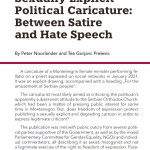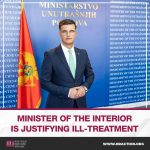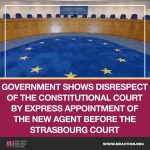- HRA kontakt
- Tel: +382 20 232 348
- hra@t-com.me
9/9/2015 – UPON REACTIONS TO THE COLUMN “RULES OF BROTHEL”
8/9/2015 – HRA CONDEMNS OBSTRUCTION OF PUBLIC DISCUSSION IN BIJELO POLJE
08/09/2015
Monitoring of Journalistic Self-Regulatory Bodies in Montenegro (September 2012 – September 2014)
10/09/20159/9/2015 – UPON REACTIONS TO THE COLUMN “RULES OF BROTHEL”
The case of the column ”Rules of Brothel” raised interesting issues regarding freedom of expression and operation of institutions in addition to political issues, which are not subject of interest to NGO Human Rights Action.
Ministry for Human and Minority Rights directly jeopardised media freedom by publicly claiming that the author of column “Rules of Brothel” Željko Ivanović, director of Vijesti, “severely violated human rights of women”. In this way the executive power inappropriately interfered with the jurisdiction of media self-regulatory bodies and courts.
Instead of taking a position in an individual case, the Ministry should have reminded RTCG and other media editors who protested against the column before international organisations to address the competent self-regulatory bodies (Ombudsman of Vijesti, Media Self-Regulatory Council), or competent court in Montenegro. The practice that the executive authority publishes positions about who violated whose rights or standards of professional ethics in individual cases is not in accordance with the rule of law and democratic standards and undermines the authority of the competent institutions in Montenegro which deserve support.
HRA believes that the Ombudsman also has not properly balanced freedom of expression with the right to privacy in his reaction to this column. However, given that the Ombudsman is an independent state body that de jure does not belong to the executive branch, his positions do not jeopardise freedom of expression in the same manner as the positions of the executive branch.
Following publication of the disputed column, media editors protested by addressing foreign countries joined in international organizations (EU, UN and OSCE). Without denying their right to do so, HRA believes that, in order to promote ethics in the media and resolve the disputed situation, it would have been more effective if they addressed the local media self-regulatory bodies, one of which they themselves established. (HRA checked that no one addressed the Ombudsman of Vijesti and the Media Self-Regulatory Council’s representative previously publically stated that no one addressed this body regarding the column as well).
Regarding denouncing, condemning, slandering and insulting representatives of international organisations and local NGOs, including HRA, by the editorial board of RTCG, because they have not taken a position on the disputed column within the deadline determined by the editorial board of RTCG, HRA filed on 7 September 2015 a petition to the self-regulatory body of RTCG – Commission for Petitions and Complaints of Listeners and Viewers – tending to use the institution of the competent self-regulatory body to advocate for ethical conduct of the media which should act objectively and impartially and thus inspire confidence as a public service.
HRA pointed out in the petition that RTCG, instead of objectively informing on different perspectives of the disputed column and limits of freedom of expression, came down severely on NGOs and representatives of international organisations, which do not have the duty to take a position on every individual case, within an imposed deadline, on matters for which competent institutions exist in Montenegro (Ombudsman of Vijesti, Media Self-Regulatory Council), and which no one addressed.
HRA believed it was not necessary to comment the column in any way, as we do not normally do so also in other cases of controversial author texts and articles that are published on daily basis. Our role is to contribute that public institutions and media self-regulatory bodies do their job as professionally as possible.
However, in order to avoid sounding vague, HRA believes that Ivanović’s manner of expression may be disliked and considered excessive, but his metaphorical expression on the topic of public interest in this specific case is protected by freedom of expression. Prohibiting strong author criticism of conduct in the media and politics would stifle that freedom which represents the foundation of democratic society, because it helps reaching a realistic assessment of the situation and finding the best solutions through publishing and confronting different views on social phenomena.
HRA reminds of the position of the European Court of Human Rights that freedom of expression protects author’s style of expression, which includes exaggeration – hyperbole, satire, irony, sarcasm, insulting, shocking and disturbing, if it comes to a topic of public interest, if there is a factual basis for such claims, and if it is not a gratuitous personal attack (see HRA Bulletin XVI – ECtHR and insult).
Answering the question whether Ivanović’s value judgment that in Montenegrin public scene “everything was for sale” and that “rules of brothel applied” had any factual basis is the job of a court or self-regulatory bodies, but also the right of judgment of those who read the column and see the published unedited recording of conversation between the politician and journalist of the Television of Montenegro, to which the author of the disputed column reacted, as well as the interview broadcasted afterwards.
The content of the unedited conversation shows biased behaviour of the journalist on one hand, and calculations of the politician on the other. By this biased conversation, advice and agreement on what will the journalist ask and what will her interlocutor reply, the journalist did not represent public interest in her public role as the journalist of the public-service broadcaster of Montenegro. (E.g. when speaking about NATO, it would have been in public interest if she attempted to learn his position on this matter and asked him why had he been silent about it, rather than “advising” him to stick to the position “let it pass without us”. It is indicative that this question was not present in the then broadcasted interview. Backbiting on other participants at the public scene was also not appropriate for public-service journalist, even when preparing for the interview). On the other hand, the political positions the opposition leader communicated to the journalist had ambiguous political connotations subject to commentaries.
Finally, HRA believes it evident that the author of the column included the opposition leader in the metaphor, so in this case violation of “women’s rights”, established by the Ministry, cannot even be considered.
HRA team







 English
English